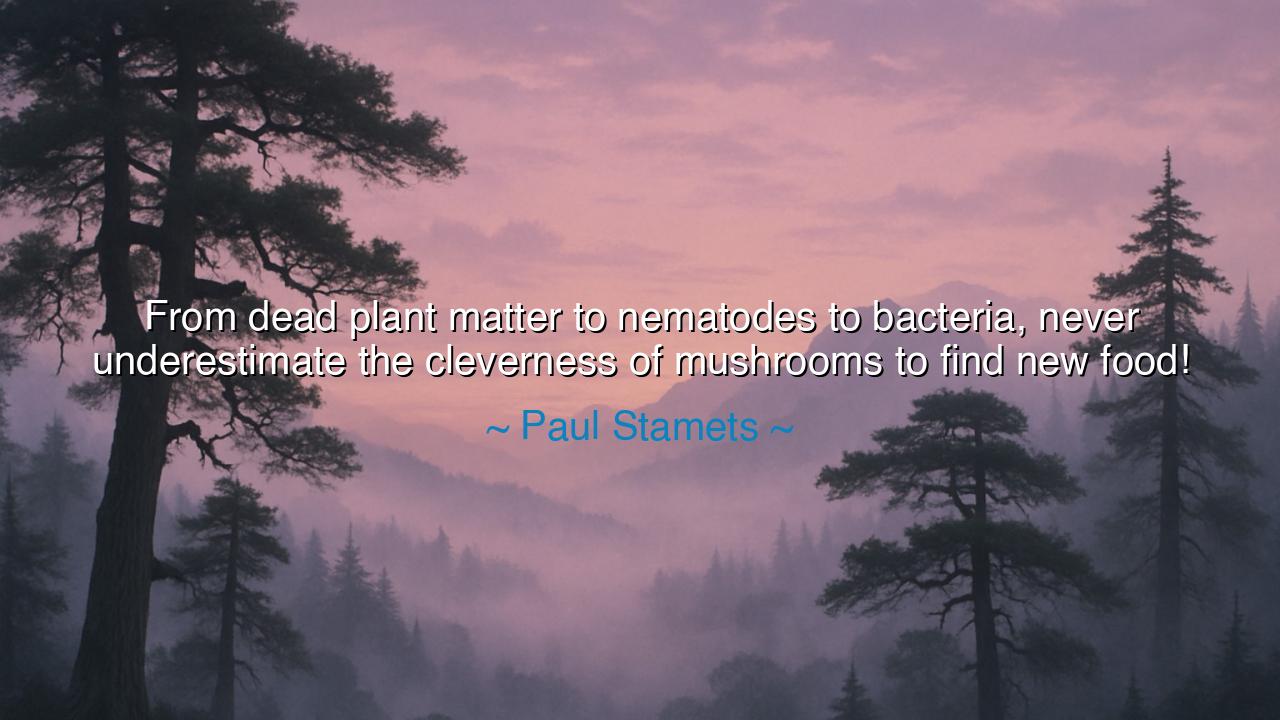
From dead plant matter to nematodes to bacteria, never
From dead plant matter to nematodes to bacteria, never underestimate the cleverness of mushrooms to find new food!






Host: The quiet hum of the evening filled the room, the soft glow of the light casting gentle shadows as Jack and Jeeny sat at the table, their conversation taking an unexpected turn into the world of mushrooms. The richness of the topic felt almost surreal, yet the depth of the idea was profound. Paul Stamets’ words echoed through the space, a reminder of the hidden intelligence in nature.
Jack: “You know, Paul Stamets really has a way of showing us how much we underestimate the world around us. The idea that mushrooms—of all things—can be so clever in finding new sources of food, from dead plant matter to nematodes to bacteria… it’s a strange concept, but it makes you wonder how much we overlook in nature. These organisms are essentially survivalists, figuring out ways to thrive in ways we don’t often give them credit for.”
Jeeny: “It’s amazing, right? Mushrooms are like nature’s recyclers, always finding ways to break down organic material and turn it into something else. But it’s more than just breaking things down; it’s about their ability to adapt and innovate. The way mushrooms can find new food sources, even in challenging environments, shows just how resourceful nature can be when it comes to survival. It’s like they have an innate intelligence that we’ve only begun to understand.”
Jack: “Exactly. And it’s not just about them feeding off of dead plant matter—it’s that they have this adaptability that allows them to survive in such a wide range of conditions. They don’t just accept what’s available; they go out and find new sources, actively seeking out what will sustain them. There’s a certain ingenuity to that, don’t you think?”
Jeeny: “Absolutely. And it’s fascinating to think about how fungi are often overlooked, despite their incredible role in the ecosystem. We tend to focus on the flashy, more obvious aspects of nature—like animals or plants—but fungi are quietly doing the work of decomposition, transforming waste into something productive. They’re not just passive; they’re actively shaping the environment in ways we’re still trying to understand.”
Jack: “And maybe that’s a lesson we can take from them, right? The way mushrooms thrive in the face of adversity is a reminder that there’s always a way forward, no matter the situation. We’re so used to looking at problems through a lens of scarcity, but nature, especially something like mushrooms, shows us that if we’re creative enough, we can find new paths.”
Jeeny: “Exactly. It’s about innovation and adaptation. The idea that you can always find a new source of food—literally, a way to survive—no matter how depleted the environment may seem. It’s this natural resilience that mushrooms embody. They remind us that even in the harshest environments, there’s always the possibility to grow, to find new opportunities, and to adapt to change.”
Jack: “That’s what makes them so fascinating. It’s not just that they survive—they do so by being clever, constantly looking for ways to thrive. And in a world that often feels overwhelmed by challenges, mushrooms offer a kind of quiet, persistent wisdom. They show us that it’s not about finding the easiest path, but being resourceful enough to make use of whatever you have.”
Jeeny: “Right. And they do it without any grand gestures. It’s this small, steady, and quiet intelligence. It’s like they have this ability to see potential in things others might consider dead or useless. And that’s where the real lesson lies—not in grand, sweeping actions, but in finding ways to make the most of what you have, and adapt in ways you never imagined possible.”
Host: The conversation lingers in the room, the quiet wonder of mushrooms and their ability to find new sources of nourishment, adapting and thriving in environments where others might falter. The analogy to life itself is clear—the need to be resilient, to seek out opportunities even in the most unexpected places, and to understand that there’s always a way forward if we’re clever enough to find it. The world outside continues, but here, in this moment, nature’s quiet ingenuity has left its mark on their thoughts.






AAdministratorAdministrator
Welcome, honored guests. Please leave a comment, we will respond soon